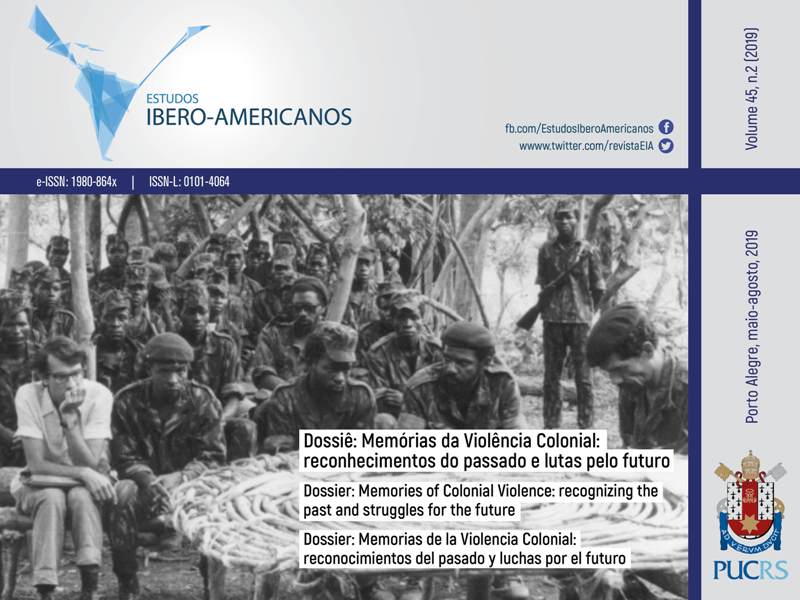Beyond the censorial pen: the gray areas around literary censorship during the First Francoism
DOI:
https://doi.org/10.15448/1980-864X.2019.2.31096Keywords:
Censorship. Francoism. Literature. Negotiation.Abstract
The aim of this paper is to study the literary censorship during the First Francoism through the analysis of the legislation created on the subject in question and the various facets of the censor process, as well as the actors involved therein. For this, we intend to reflect on the gray areas in the censor process, through the analysis of the negotiation strategies developed by writers in relation to censorship. Therefore, we intend to offer a more complex model that identifies the nuances of censorship’s “power” and its relationship with writers and readers. The investigation was carried out, fundamentally, in the Archivo General de la Administración (AGA) and in the Fundación Pública Gallega Camilo José Cela (FPGCJC).
Downloads
References
ABELLÁN, Manuel L. Censura como historia. Bulletin d'Histoire Contemporaine de l'Espagne, Aix-en-Provence, n. 11-12, p. 26-33, 2003.
ÁLVAREZ PALACIOS, Fernando. Novela y cultura española de postguerra. Madrid: Cuadernos para el Diálogo, 1975.
ANDRÉS DE BLAS, José. La censura de libros durante la Guerra Civil Española. In: RUIZ BAUTISTA, Eduardo (coord.). Tiempo de censura: la represión editorial durante el franquismo. Gijón: Trea, 2008. p. 19-44.
https://doi.org/10.5209/rev_esmp.2012.v18.n2.41032
AZNAR SOLER, Manuel (coord.). Escritores, editoriales y revistas del exilio republicano de 1939. Madrid: Renacimiento, 2006.
BERMEJO SÁNCHEZ, Benito. La vicesecretaría de educación popular (1941-1945): un “ministerio” de la Propaganda en manos de la falange. Espacio, Tiempo y Forma, Madrid, n. 4, p. 73-96, 1991.
https://doi.org/10.3989/arbor.2011.751n5005
BHABHA, Homi K. O local da cultura. Belo Horizonte: UFMG, 1998.
BOURDIEU, Pierre. Cosas dichas. Barcelona: Gedisa, 1993.
CHARTIER, Roger. A ordem dos livros. 2. ed. Brasília: UnB, 1999.
CHARTIER, Roger. Pluma de Ganso, libro de leras, ojo viajero. México: Universidad Iberoamericana, 1997.
https://doi.org/10.22201/iibi.0187358xp.2000.28.3937
CHULIÁ RODRIGO, Elisa. La evolución silenciosa de las dictaduras: el régimen de Franco ante la prensa y el periodismo. Madrid: Instituto Juan March, 1997.
CISQUELLA, Georgina; ERVITI JIMENO, José Luis; SOROLLA, José Antonio. La represión cultural en el franquismo: diez años de censura de libros durante la ley de Prensa (1966-1976). Barcelona: Anagrama, 2002.
https://doi.org/10.31819/9783964561770-003
COETZEE, J. M. Contra la censura: ensayos sobre la pasión por silenciar. Barcelona: Debate, 2007.
DERRIDA, Jacques. Estructura, signo y juego en el discurso de las ciencias humanas. In: MACKSEY, Richard; DONATO, Eugenio. Los lenguajes críticos y las ciencias del hombre. Barcelona: Barral, 1972.
FRIEDMAN, Susan Stanford. The return of the repressed in women’s narrative. The Journal of Narrative Technique, Ypsilanti, v. 19, n. 1, p. 141-156, Winter 1989.
GALLOFRÉ I VIRGILI, Maria Josepa. L´edició catalana i la censura franquista (1939-1951). Barcelona: Montserrat, 1991.
HALL, Stuart et al. (ed.). Culture, media, language: working papers in cultural studies, 1972-79. London: Routledge, 1996.
LARRAZ, Fernando. El monopolio de la palabra: el exilio intelectual en la España franquista. Madrid: Biblioteca Nueva, 2009.
LARRAZ, Fernando. Letricidio español: censura y novela durante el franquismo. Gijón: Trea, 2014.
https://doi.org/10.18002/ehf.v0i36.1406
MARCO, Jorge. Debemos condenar y condenamos: justicia militar y represión en España (1936-1945). In: ARÓSTEGUI, Julio (coord.). Franco: la represión como sistema. Barcelona: Flor del Viento, 2012. p. 190-229.
MARTÍNEZ, Ana. La represión cultural: libros destruidos, bibliotecas depuradas y lectura. In: ARÓSTEGUI SÁNCHEZ, Julio (coord.). Franco: la represión como sistema. Barcelona: Flor del Viento, 2012. p. 365-415.
MONTEJO GURRUCHAGA, Lucía. Algunas novelas de Darío Fernández-Flórez: de Zarabanda a Alta Costura (1954) a alta costura (1954): temas escabrosos en tiempos de restricciones moralistas. Revista de Literatura, Madrid, v. 70, n. 139, p.165-185, 2008.
https://doi.org/10.3989/revliteratura.2008.v70.i139.60
MONTEJO GURRUCHAGA, Lucía. Las "limitaciones de expresión" en España durante las décadas cincuenta y sesenta: el ejemplo de dos antologías poéticas. Epos: Revista de Filología, Madrid, n. 12, p. 277-298, 1996.
https://doi.org/10.5944/epos.12.1996.9964
NEUSCHÄFER, Hans-Jörg. Adiós a la España eterna: la dialéctica de la censura. Barcelona: Anthropos, 1994.
PATTERSON, Annabel. Reading between the lines. Madison: The University of Wisconsisn, 1993.
PORTOLÉS LÁZARO, José. La censura de la palabra: estudios de pragmática y análisis del discurso. Valencia: PUV, 2016.
RUIZ BAUTISTA, Eduardo. Los señores del libro: propagandistas, censores y bibliotecarios en el primer franquismo. Gijón: Trea, 2005.
https://doi.org/10.14198/pasado2005.4.12-10
RUIZ BAUTISTA, Eduardo (coord.). Tiempo de censura: la represión editorial durante el franquismo. Gijón: Trea, 2008.
SINOVA, Justino. La censura de prensa durante el franquismo: 1936-1951. Madrid: Espasa Calpe, 1989.
SOLDEVILA DURANTE, Ignacio. La novela del exilio. In: AUBERT, Paul (dir.). La novela en España (siglos XIX-XX). Madrid: Casa de Velázquez, 2001. p. 193-206.
Downloads
Published
How to Cite
Issue
Section
License
Copyright (c) 2019 GABRIELA DE LIMA GRECCO

This work is licensed under a Creative Commons Attribution 4.0 International License.
Copyright
The submission of originals to Estudos Ibero-Americanos implies the transfer by the authors of the right for publication. Authors retain copyright and grant the journal right of first publication. If the authors wish to include the same data into another publication, they must cite Estudos Ibero-Americanos as the site of original publication.
Creative Commons License
Except where otherwise specified, material published in this journal is licensed under a Creative Commons Attribution 4.0 International license, which allows unrestricted use, distribution and reproduction in any medium, provided the original publication is correctly cited.






